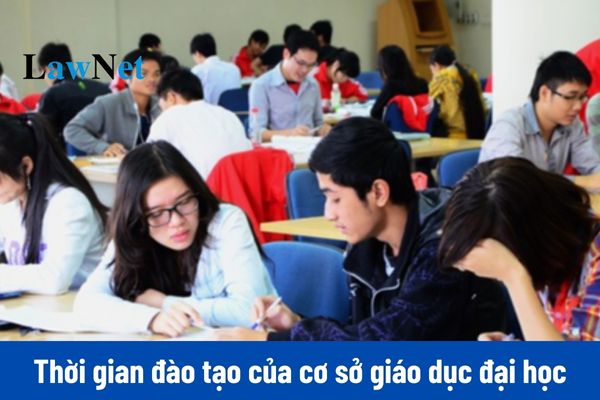What is the basis for determining the training duration of a higher education institution in Vietnam?
What is the basis for determining the training duration of a higher education institution in Vietnam?
Under Article 35 of the Law on Higher Education 2012 amended by Clause 20 Article 1 of the Law on Amendments to Law on Higher Education 2018, regulations regarding training duration are as follows:
Training duration
1. The training duration varies between the programs and levels and depends on the quantity of credits that a student has to obtain. The mandatory quantity of credits of each level is specified in the national training level framework. The principal of each higher education institution shall decide the mandatory quantity of credits of each program and level in accordance with law.
2. The Prime Minister shall consider approving the national education system framework and national training level framework; training duration of various higher education levels in the national education system framework
Thus, the training duration of a higher education institution is determined based on the quantity of credits that a student has to obtain for each program and level of training.
The quantity of credits required for each level is defined in the Vietnamese National Qualifications Framework.

What is the basis for determining the training duration of a higher education institution in Vietnam? (Image from Internet)
What are the regulations on the organization of enrolment in higher education institutions in Vietnam?
Under Article 34 of the Law on Higher Education 2012 (as amended by Point a Clause 19 Article 1 of the Law on Amendments to Law on Higher Education 2018), the regulations on enrolment targets and the organization of enrolment are as follows:
(1) Enrolment target:
- The enrolment target shall be determined on the basis of market demand, its necessity for socio-economic development, quantity and quality of available lecturers, facilities; ratio of students that are employed after graduation, and other quality assurance conditions;
b) Each higher education institution shall determine its own enrolment target; publish its enrolment target, training quality and quality assurance conditions, ratio of students employed after graduation; assurance of graduates’ quality as declared;
c) A higher education institution that violates any of the regulations on enrolment targets and conditions shall face penalties and be suspended from determining their own enrolment targets for 05 years from the day on which a conclusion is issued by a competent authority.
(2) Enrolment organization:
- The methods of enrolment include: entrance exams, profile evaluation or combination methods;
- higher education institutions shall autonomously make decisions on the enrolment methods and bear responsibilities for the enrolment.
What are the regulations on the training program of higher education institutions in Vietnam?
Under Article 36 of the Law on Higher Education 2012 (as amended by Clause 21 Article 1 and Clause 1 Article 2 of the Law on Amendments to Law on Higher Education 2018), the regulations on the training program at the bachelor's level are as follows:
- A training program includes the targets, knowledge, structure, contents and assessment methods for each subject, academic discipline, training level and output standards according to the national training level framework;
- Training programs shall be credit-based, include research-oriented programs, application-oriented program and profession-oriented programs; ensure connection between the training levels and disciplines; satisfy training program standards;
- A foreign training program may be run if it is permitted by a the competent authority of the host country and it has an unexpired license or educational quality certification issued by a lawful training quality assessment organization and complies with intellectual property laws;
- Higher education institutions are autonomous and accountable for the development, appraisal and introduction of the training programs at college, university, master’s and doctorate levels;
- Foreign-capitalized higher education institutions are autonomous and accountable for the development and implementation of the training programs evaluated by a Vietnam’s education quality assessment organization that do not harm the National defense and security, social interests, that do not distort history or negatively impact the culture, ethics, good customs, good traditions and solidarity of Vietnam’s communities as well as the world peace and security, that do not contain religious propagation;
- The contents of training programs in the form of continuing education are similar to that of the training programs in the form of formal education.

